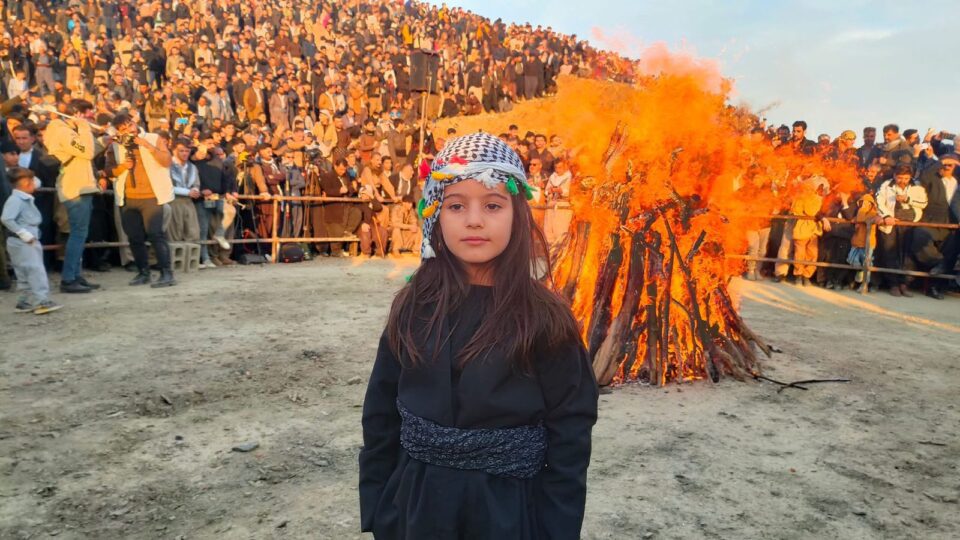In recent years, young people have been working to revive ancient Kurdish festivals. One of these is “Belndan.”
Belndan is an ancient Kurdish festival that dates back to 3000 BCE. Traditionally, it was celebrated in mid-winter when the harshness of the cold weather begins to subside and the snow starts to melt. This period marked the time when snow no longer needed to be removed from rooftops, which is why the festival is associated with the phrase “Belndan,” meaning “putting away the shovels.”
A designated square is prepared for the ceremony, where men, women, and children bring wooden sticks to prepare for a bonfire. The wood is decorated with raisins and walnuts, and the eldest person in the village lights the fire. During the ceremony, poems about Belndan are recited.
On this day, horsemen perform riding displays, archery and spear-throwing competitions take place, and Kurdish dancing and singing are enjoyed by both young men and women. The sound of drums and the zurna (a wind instrument) fills the air, adding to the vibrant atmosphere of the celebration.
In the square, artists and village comedians perform plays and share jokes and proverbs with the attendees. The festival is filled with high spirits, and everyone wears traditional Kurdish clothing, emphasizing that this is a distinctly Kurdish celebration.
However, different interpretations of the festival exist. Some dispute its meaning, arguing that it is too early to throw away snow shovels, as snow continues to fall even after the forty days of winter. Therefore, they suggest that our ancestors wouldn’t have celebrated the end of snowfall before winter actually ended.
Another interpretation links the festival to economic reasons. It is said to be celebrated during the hundred-day period of sheep breeding and pregnancy. After sheep are bred in the fall, about 70 days pass (including the “great forty days” of winter), during which lambs develop in their mothers’ wombs, and the risk of miscarriage decreases.
Others attribute the festival to religious reasons, connecting it to forty days after Yalda Night. Yalda, the longest night of the year, is celebrated by staying up all night telling stories, playing games, and eating “night snacks.” Yalda, reportedly a Syriac word meaning “birth,” could refer to the birth of Mithra, the sun, or even the creation of Earth. Among Kurds, it is known as “Shevi Chila” (the Night of Forty).
The Belndan Festival holds both economic and religious significance. The number 40 is important in Kurdish culture and neighboring traditions: the Forty Hidden Riders, the Forty Degrees of Oman, “Childana” and “Chilbarda” (cultural concepts), mourning periods of 40 days for the deceased, and Sufis purifying themselves through 40 days of seclusion. Humans reach maturity at 40 years, women give birth after 40 weeks, and there is a celebration when a baby survives its first 40 days of life.
The division of winter into the “great forty” and “small forty” days stems from this cultural importance. Yalda Night, representing the birth of Mithra (the sun and light), is celebrated after forty days have passed since this birth. This marks a celebration for surviving the first forty days, much like a celebration of a baby reaching a milestone where it is no longer at risk of early death.
The forty days following this religious-mythological birth coincide with the hundred days of sheep pregnancy. Here, followers of Mithra combine two celebrations. One marks forty days since the birth of Mithra and light, symbolizing the survival of a baby’s first forty days; the other marks the hundred days of a lamb’s pregnancy, when it becomes viable in its mother’s womb.
The first celebration honors the forty days since a baby’s birth, while the second celebrates the hundred days of another baby (a lamb) nearing the end of its gestation. Both mark the end of risk, with fate promising the survival of both. From the intersection of these two promises and good omens, the celebration of Belndan (Promise-giving) is born.
In other words, what is known as “Belndan” in some parts of Eastern Kurdistan was originally “Belendan” (Promise-giving). Over time, the two words—“Belendan” (Promise-giving) and “Belndan” (shovel-putting)—became mixed due to their similar pronunciation. The concepts of promise, pledge, commitment, and loyalty are fundamental to Mithraism, a religion centered on promises and commitments.
By Muayiad Ahmed

